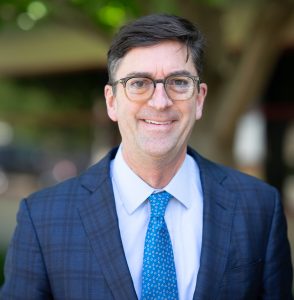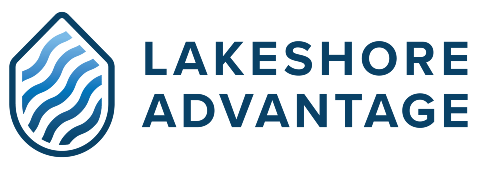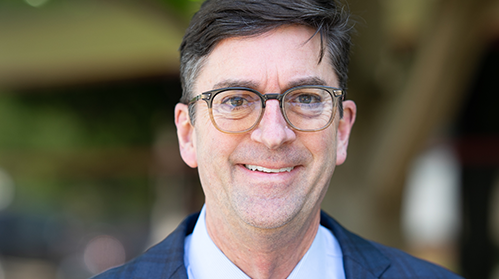Andrew Boatright became the General Manager for the Zeeland Board of Public Works in January 2019. Previously, he served as the Deputy Director for the City of Independence (Missouri) Power & Light (2016-2018) and the Electric Utility Manager for the City of Westerville (Ohio) Electric Division (1996-2016). He has also held positions at Public Power utilities Richmond (Indiana) Power & Light and the City of Rensselaer (Indiana).

Andrew has also served in leadership roles on various American Public Power Association boards and committees (publicpower.org). He is a licensed Professional Engineer and a graduate of Purdue University with a Bachelor of Science in Electrical Engineering Technology and holds a master’s degree in business administration from Otterbein University.
He and his wife Eileen of 40 years have three adult children – all three residing in New York. They have one child living at home – Oliver, age 13, an untrained brown Labrador Retriever.
What led you down your professional path and what about your work is most meaningful or fascinating to you?
In my childhood in a small town in Indiana, I was enamored by my oldest brother, 14 years my senior, who had a penchant for creating electronic networks and devices to control audio equipment including radios, televisions, and high-fidelity equipment. He had an inventory full of vacuum tubes neatly arranged in his closet, which friends and neighbors would occasionally come to our house to access for replacements for their broken devices. My brother attended Purdue University and graduated from the Electrical Engineering program there. My father and mother both graduated from Purdue. I was brainwashed.
Early on in my post-secondary education, I became uncertain about my career path and took time off from college. I began working as an Engineering Technician at an investor-owned electric utility in south-central Indiana. This is what ultimately charted my course for a career in the electric utility industry. I returned to college and worked at this utility before and after graduation. Not long after becoming fully employed at this same investor-owned utility, I decided to change career paths with a move to a small community in Northwest Indiana to work for a municipally owned electric utility. I soon realized that what drove my passion and inspiration in pursuit of a career path was the opportunity to be of service to the community where I work AND live. This was in 1983, and I’ve been employed in the municipally owned utility business ever since. The municipally owned utility is the best business model for the provision of essential services of electricity and water where the value proposition is SERVICE.
What about your work has you most excited right now?
The utility sector was once a very reactive industry but is now quite the opposite, embracing technology for use in detecting service disruptions and changes – well before the customer can pick up the phone to let us know. We are now providing ways for our customers to interact with us, whether it’s how and when they make payments for utility services, or in their ability to access detailed near-real time information about their energy and water usage. Don’t get me wrong, we still always want to hear from our customers. The electric and water industry is rapidly changing and we, like all service-oriented businesses, need to be responsive to and closely tracking with the ever-evolving customer experience.
What have you learned in your leadership role and what advice would you give to others in a new leadership role?
I really appreciate the generosity of the individuals who have helped me learn and grow. Early in my career, I received mentoring from numerous people who, as I look back on it now, likely took succession planning very seriously. They never said so, but it was understood this industry wasn’t always seen as glamorous. I experienced the greatest growth and maturity throughout my career when I ventured outside of my comfort zone.
I’ve also learned that leadership is not reserved only for those in executive leadership positions. Leadership comes in many forms and can be practiced at all levels of an organization. This is a function of an organization’s culture – which IS highly influenced by the organization’s executive leadership. Organizations that empower employees—who have presumably been hired as subject matter experts—to lead and execute can achieve results with seemingly fewer resources. Furthermore, leaders develop through this system, which creates a pipeline for succession.
Who are the people who have had a profound influence on you and your leadership style?
I’ve never intentionally designated a single person as a mentor, but I have self-selected various leaders throughout my career whom I have observed from afar or worked alongside throughout my career and have taken notes. These leaders may be musicians, athletes, clergy, actors, business associates, co-workers, family, friends, etc. Many of them were excellent and some not so excellent leaders. I learned from their successes and failures as I observed them.
There is great value in continuous leadership development, no matter where you are in your career. In recent months, I’ve been blessed, as have the other members of our leadership team, with the good fortune of participating in Lead 24/7 leadership development. As a Lead 24/7 alum, I am continuing monthly executive coaching and alumni group meetings. As I approach the conclusion of my traditional work-life, I only wish I had established my leadership development plan earlier on in my career. Regardless, it’s never too late to improve one’s leadership skills.
Talk to us about workplace culture. What are some values that you and your team live by?
In 2022, our Leadership Team and Board of Commissioners updated our Strategic Plan, including developing our Core Values. It was important that we not only identify the “words” that define our organizational values, but also the behaviors behind those words. Our Core Values are: Safety, Family-Oriented Workplace Culture, Integrity, Continuous Improvement, and Service and Stewardship. These words alone leave much room for interpretation. But the behavior statements behind them describe what the words mean to us. I encourage readers to look at our Strategic Plan document which can be found on our website and observe the behavior statements listed under each Core Value. We have an amazingly talented and hard-working team who are all true leaders who exemplify the essence of our workplace culture.
What is a book that you’ve read or an influencer that you’ve listened to recently that has made you a better leader?
The one book that has become the basis for a career objective of mine is The Five Dysfunctions of a Team: A Leadership Fable by Patrick M. Lencioni. The concepts seem so simple, and it’s relatively easy to identify where team dysfunction exists. Yet overcoming dysfunction requires tremendous energy and discipline on everyone’s part. I have become a better leader through understanding my own shortcomings and how I may be impeding our ability to achieve high performance as a team. There are times when it feels as though we’ve mastered teamwork and other times where our shortcomings reveal we’re not quite there yet. It’s much like exercise: you must remain disciplined in training yourself to function the way you want to. It’s a struggle, but one well worth the effort!
Can you share why it is a priority for you to invest in economic development?
As the electricity and water provider to homes and businesses in and around Zeeland, we take very seriously our role as a partner and facilitator in helping to make everyone else wildly successful. This comes in many forms: low, not-for-profit rates; clean and reliable services; local stakeholder input; and local governance, to name a few. We also recognize the need to support the community by being active in organizations such as Lakeshore Advantage and the West Coast Chamber. Support in other ways such as our Community Grant Program and Holiday Power Dollars demonstrates our desire to create win-win scenarios for everyone in our community. Support also comes in the form of recognizing our community’s diversity by eliminating language barriers and exemplifying equity and inclusion throughout the community we serve. Quoting our Strategic Plan, “Our best means of doing this is through a strong emphasis on exploration, collaboration, and where appropriate, leveraging our resources to improve the community’s quality of life. Our success is directly attributable to the community’s success, and we are committed to supporting all our stakeholders with the provision of essential utility services that are reliable, safe, and cost-competitive.”



